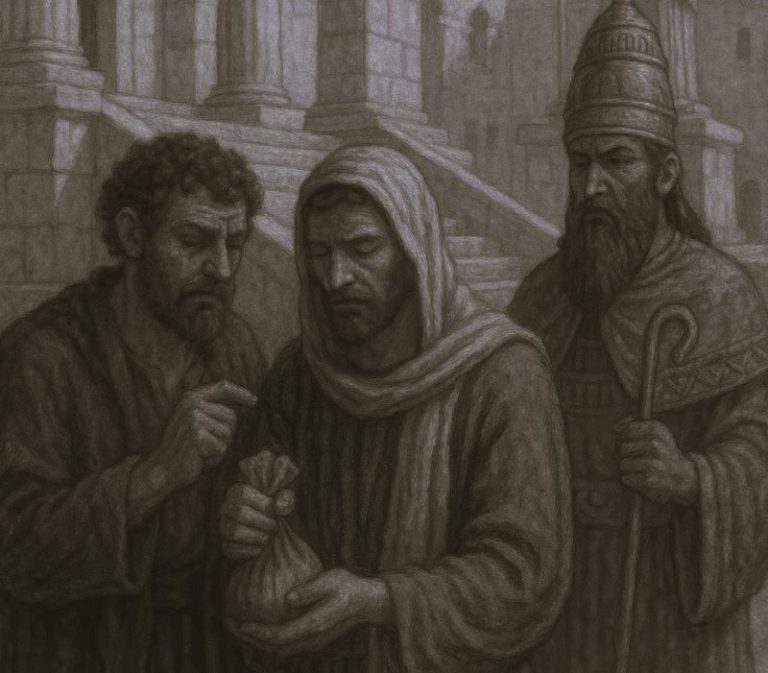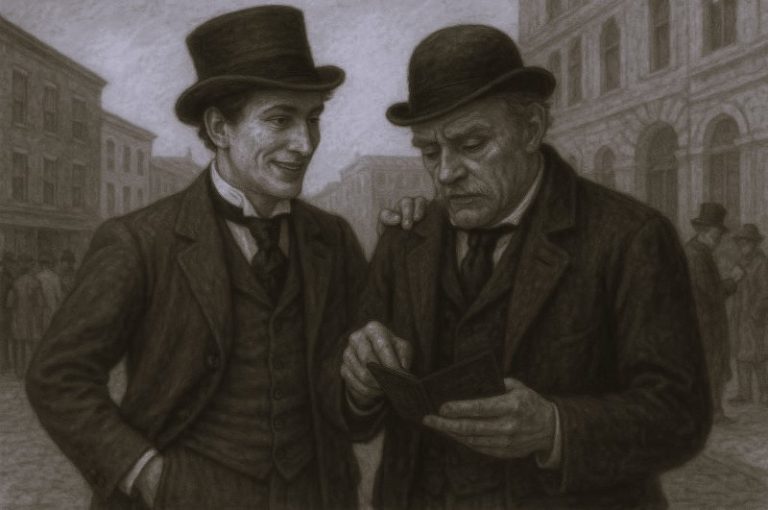


Curated/Reviewed by Matthew A. McIntosh
Public Historian
Brewminate
Introduction
The term public opinion was derived from the French opinion publique which was first used in 1588 by Michel de Montaigne in the second edition of his Essays (ch. XXII).[1]
The French term also appears in the 1761 work Julie, or the New Heloise by Jean-Jacques Rousseau.[2][3]
Precursors of the phrase in English include William Temple’s “general opinion” (appearing in his 1672 work On the Original and Nature of Government) and John Locke’s “law of opinion” (appearing in his 1689 work An Essay Concerning Human Understanding).[3]
Impetus
The emergence of public opinion as a significant force in the political realm can be dated to the late 17th century. However, opinion had been regarded as having singular importance since far earlier. Medieval fama publica or vox et fama communis had great legal and social importance from the 12th and 13th centuries onward.[4] Later, William Shakespeare called public opinion the “mistress of success” and Blaise Pascal thought it was “the queen of the world”.
In his treatise An Essay Concerning Human Understanding c, John Locke considered that man was subject to three laws: the divine law, the civil law and most importantly in Locke’s judgement, the law of opinion or reputation. He regarded the latter as of the highest importance because dislike and ill opinion force people to conform in their behaviour to social norms, however he didn’t consider public opinion as a suitable influence for governments.
In his 1672 essay On the Original and Nature of Government, William Temple gave an early formulation of the importance of public opinion. He observed that “when vast numbers of men submit their lives and fortunes absolutely to the will of one, it must be force of custom, or opinion which subjects power to authority”. Temple disagreed with the prevalent opinion that the basis of government lay in a social contract and thought that government was merely allowed to exist due to the favour of public opinion.[5]
The prerequisites for the emergence of a public sphere were increasing levels of literacy which was spurred on by the Reformation, which encouraged individuals to read the Bible in the vernacular, and the rapidly expanding printing presses. During the 18th century religious literature was replaced with secular literature, novels and pamphlets. In parallel to this was the growth in reading societies and clubs. At the turn of the century the first circulating library opened in London and the public library became widespread and available to the public.
Coffeehouses

An institution of central importance in the development of public opinion, was the coffee-house, which became widespread throughout Europe in the mid-17th century. Although Charles II later tried to suppress the London coffeehouses as “places where the disaffected met, and spread scandalous reports concerning the conduct of His Majesty and his Ministers”, the public flocked to them. For several decades following the Restoration, the Wits gathered round John Dryden at Will’s Coffee House in Russell Street, Covent Garden.[6] The coffee houses were great social levellers, open to all men and indifferent to social status, and as a result associated with equality and republicanism.
More generally, coffee houses became meeting places where business could be carried on, news exchanged and The London Gazette (government announcements) read. Lloyd’s of London had its origins in a coffeehouse run by Edward Lloyd, where underwriters of ship insurance met to do business. By 1739, there were 551 coffeehouses in London. Each attracted a particular clientele divided by occupation or attitude, such as Tories and Whigs, wits and stockjobbers, merchants and lawyers, booksellers and authors, men of fashion or the “cits” of the old city center. Joseph Addison wanted to have it said of him that he had “brought philosophy out of closets and libraries to dwell in clubs and assemblies, at tea tables and in coffee houses”. According to one French visitor, Antoine François Prévost, coffeehouses, “where you have the right to read all the papers for and against the government”, were the “seats of English liberty”.[7]
Gentleman Clubs

Gentlemen’s clubs proliferated in the 18th century, especially in the West End of London. Clubs took over the role occupied by coffee houses in 18th century London to some degree and reached the height of their influence in the late 19th century. Some notable names were White’s, Brooks’s, Arthur’s and Boodle’s which still exist today.
These social changes, in which a closed and largely illiterate public became an open and politicized one, was to become of tremendous political importance in the 19th century as the mass media was circulated ever more widely and literacy was steadily improved. Governments increasingly recognized the importance of managing and directing public opinion. This trend is exemplified in the career of George Canning who restyled his political career from its aristocratic origins to one of popular consent when he contested and won the parliamentary seat in Liverpool, a city with a growing and affluent middle class which he attributed to the growing influence of “public opinion”.[8]
Jeremy Bentham was an impassioned advocate of the importance of public opinion in the shaping of constitutional governance. He thought it important that all government acts and decisions should be subject to the inspection of public opinion, because “to the pernicious exercise of the power of government it is the only check”.[9] He opined that public opinion had the power to ensure that rulers would rule for the greatest happiness of the greater number. He brought in Utilitarian philosophy in order to define theories of public opinion.
Appendix
Endnotes
- Kurt Braatz, Friedrich Nietzsche: Eine Studie zur Theorie der Öffentlichen Meinung, Walter de Gruyter, 2011, p. 1.
- The term opinion publique appears in the chapter: “Lettre XXIV à Julie” of the book.
- Speier, Hans (1950). “Historical Development of Public Opinion”. American Journal of Sociology. 55 (4): 376–388.
- See (in French) Julien Théry, “Fama : l’opinion publique comme preuve judiciaire. Aperçu sur la révolution médiévale de l’inquisitoire (XIIe-XIVe s.)”, in B. Lemesle (ed.), La preuve en justice de l’Antiquité à nos jours, Rennes, PUR, 2003, pp. 119–147, available online, and Daniel Smail, Thelma Fernster (ed), Fama. The Politics of Talk and Reputation, Ithaca, Cornell University Press, 2003.
- Speier, Hans (1950). “Historical Development of Public Opinion”. American Journal of Sociology. University of Chicago Press. 55 (4): 376–88.
- An historical and chronological deduction of the origin of commerce, from the earliest accounts. : Containing an history of the great commercial interests of the British Empire. To which is prefixed an introduction, exhibiting a view of the ancient and modern state of Europe ; of the importance of our colonies ; and of the commerce, shipping, manufactures, fisheries, &c., of Great-Britain and Ireland ; and their influence on the landed interest. With an appendix, containing the modern politico-commercial geography of the several countries of Europe. Author: Adam Anderson; William Combe; John Walter; Logographic Press.
- Prévost, Abbé (1930) Adventures of a man of quality (translation of Séjour en Angleterre, v. 5 of Mémoires et avantures d’un homme de qualité qui s’est retiré du monde) G. Routledge & Sons, London
- Stephen M. Lee, “George Canning and Liberal Toryism, 1801–1827” Woodbridge: Boydell & Brewer, 2008
- “public opinion”.
Bibliography
- Edward L. Bernays, Crystallizing Public Opinion, 1923.
- Daniel L. Smail, Thelma Fernster, Fama. The Politics of Talk and Reputation, Ithaca, Cornell University Press, 2003.
- Jürgen Habermas, The Structural Transformation of the Public Sphere, 1989 (Strukturwandel der Öffentlichkeit, Neuwied 1962).
- Jacob Shamir/Michal Shamir, The Anatomy of Public Opinion, Ann Arbor: University of Michigan Press, 2000.
- Walter Lippmann, Public Opinion, 1922.
- Norman John Powell, Anatomy of Public Opinion, New York, Prentice-Hall, 1951.
- (in French) Julien Théry, “Fama : l’opinion publique comme preuve. Aperçu sur la révolution médiévale de l’inquisitoire (XIIe-XIVe siècles)”, in B. Lemesle (ed.), La preuve en justice de l’Antiquité à nos jours, Rennes, Presses universitaires de Rennes, 2003, pp. 119–147, online.
- Ferdinand Tönnies, On Public Opinion, 1970 (Kritik der öffentlichen Meinung, 1922, critical edition by Alexander Deichsel, Rolf Fechner, and Rainer Waßner, Berlin/New York: Walter de Gruyter 2003)
- Bianco, William T., and David T. Canon. “Public Opinion.” In American Politics Today. 3rd ed. New York: W.W. Norton, 2013.
Originally published by Wikipedia, 04.25.2003, under a Creative Commons Attribution-ShareAlike 3.0 Unported license.






